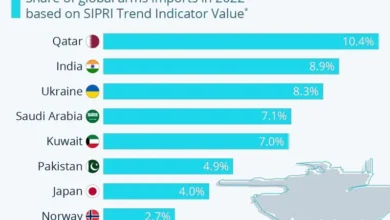UK weather: 2023 was second warmest year on record, says Met Office

Last year was the UK’s second warmest on record, according to provisional data from the Met Office.
This puts it just behind 2022, which recorded an average temperature of only 0.06C higher.
For both Wales and Northern Ireland, 2023 was their hottest year on record.
The national weather service said climate change has made the high temperatures “significantly more likely”.
Met Office Senior Scientist Mike Kendon said: “The observations of the UK climate are clear. Climate change is influencing UK temperature records over the long term, with 2023 going down as another very warm year.
“While our climate will remain variable, with periods of cold and wet weather, what we have observed over recent decades is a number of high temperature records tumbling.”
The summer in the UK was bookended by the hottest June and joint hottest September on record, with temperatures reaching over 33C.
The UK has some of the oldest temperature records in the world. The Central England Temperature series kept by the Met Office goes back to 1659.
Despite successive hottest years on record the government was warned in July of leaving the UK unprepared for climate change, by its own advisors. In 2022, around 3,000 more deaths than average in the over-65s were reported and 20% of operations were cancelled
On Tuesday, Doug Parr, Greenpeace UK’s policy director, said that the recent actions of Prime Minister Rishi Sunak on climate change will only worsen the impact.
“Climate alarm bells are ringing, but Sunak has his fingers in his ears. “Our Prime Minister’s newest plans consist of ramping up oil and gas drilling in the North Sea and delaying key policies that would slash emissions from cars and housing – or scrapping them altogether.”
A government spokesperson said: “We are committed to tackling climate change by meeting our net zero targets and international commitments, all without placing undue burdens on families.”
Average rainfall last year was also up, by 11% across the UK, but by more than 20% in England and Northern Ireland.
Scientists predict the UK will experience hotter, drier summers and warmer, wetter winters due to climate change. As the air warms up it is able to hold more moisture, resulting in increased rainfall.
The record temperatures in the UK were also seen across the world. There were wildfires in Greece, Tunisia and Hawaii, historically high sea temperatures in the Atlantic, a record wildfire season in Canada and worrying lows in Antarctic sea-ice.
In January, the Copernicus Climate Change Service is expected to confirm that 2023 was the hottest year globally. The above average temperatures have been likely driven in large part by climate change but also by the natural weather phenomenon El Niño.
During an El Niño event, winds in the eastern Pacific weaken, keeping warm waters closer to the surface and sending them eastwards. This releases more heat into the atmosphere, creating warmer and wetter air.
It is not known for sure how long the El Niño will last but it is expected it will run through the first half of this year. This will likely also make 2024 the world’s hottest on record, and push the world past the key 1.5C warming milestone.
Hitting the threshold would mean the world is 1.5C warmer on average than it was during the late 1800s, when fossil fuel emissions from industrialisation really began to ramp up.
The 1.5C figure has become a symbol of global climate change negotiations. Countries agreed to “pursue efforts” to limit global temperature rises to 1.5C under the 2015 Paris agreement.











